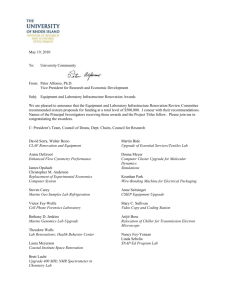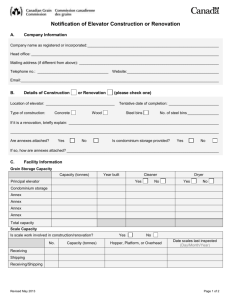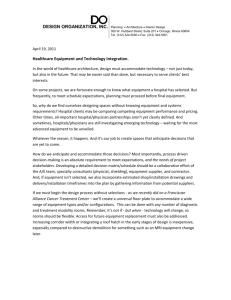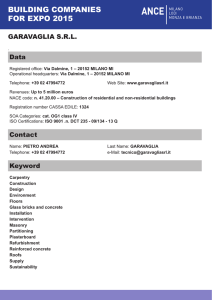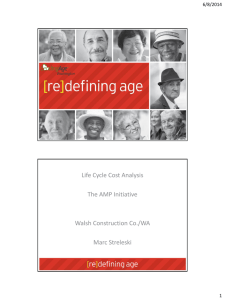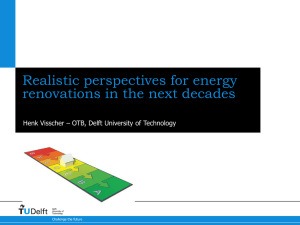Deep retrofit of older office buildings - Task 47
advertisement
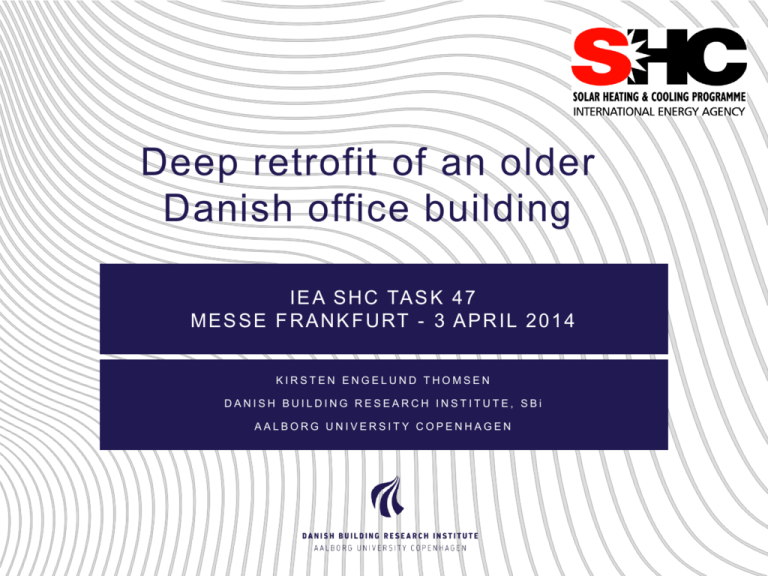
Deep retrofit of an older Danish office building I E A S H C TA S K 4 7 M E S S E F R A N K F U RT - 3 A P R I L 2 0 1 4 KIRSTEN ENGELUND THOMSEN DANISH BUILDING RESEARCH INSTITUTE, SBi AALBORG UNIVERSITY COPENHAGEN Rockwool International Office Building “Center 2” Hovedgaden 584, 2640 Hedehusene, Denmark 1. INTRODUCTION PROJECT SUMMARY Representative picture of the project; e.g main facade Construction year: 1979 Energy renovation: 2013 SPECIAL FEATURES - New facades, floors and ceilings New windows with 3 layers of glass New ventilation system with higher efficiency and heat recovery New heating system (heat pumps) New water based solar collectors New photovoltaic system ARCHITECT Vandkunsten A/S ENGINEER MOE A/S CONTRACTOR Jakon A/S OWNER Rockwool International A/S Brochure authors: Kirsten Engelund Thomsen and Jørgen Rose Danish Building Research Institute, AAU Contact: ket@sbi.aau.dk IEA – SHC Task 47 Renovation of Non-Residential Buildings towards Sustainable Standards 2. CONTEXT AND BACKGROUND Picture/figure BACKGROUND The office space was outdated and the energy performance and indoor climate were far below the current standard. The existing building was heated by electrical heating and with standard double-glazed windows. The ventilation system was without heat recovery. There is a parking lot below the building and the floor construction was poorly insulated resulting in a large heat loss through the floor. OBJECTIVES OF THE RENOVATION The aim of the renovation has been to upgrade the energy performance to meet the future Danish low energy class 2015 for new buildings and to achieve a high quality office work space. SUMMARY OF THE RENOVATION - New facades with Rockwool-FlexSystem 3 layer windows (U-value 0.75 W/m²K) Extra 180 mm Hardrock insulation and granulate in the parking deck LED electrical lighting Mechanical ventilation with heat recovery Natural ventilation in the top of the building Heat pumps with vertical 120 m deep wells 86 m² solar panels for hot water 170 m² PV (production 7 kWh/m² year) The renovated building will be EEC-ECOLife certified Two out of four green gardens are covered by a roof to create two atriums Existing construction Facade before and after retrofitting Plan 3. DECISION MAKING PROCESSES - Rockwool International A/S initiated the project. The main incentives for the renovation was to reduce energy consumption for the 34 year old office building and to make attractive, up-to-date working space areas for 120 employees - Furthermore, Rockwool wanted to focus on the challenges and possibilities there are in raising the energy standard in industrial constructions - The building had a very high energy consumption of approx. 264 kWh/m2 per year - An alternative to the extensive renovation was to demolish the old office building and construct a new one. However, this solution turned out to be much more expensive and to have a higher environmental impact, primarily due to the heavy concrete structure of the existing building Picture/figure - Interior of standard room circulation area representative area Timeline for the decision making process - Idea born: … - First brief project description completed: - Detailed project description completed: - Tendering process started: - Signing of contract with main contractor: - Start refurbishment: - Refurbishment completed: Timeline for the decision making process Idea was born 01.05.2008 First brief project description completed 01.05.2009 Detailed project description completed 01.11.2010 Tendering process started 01.12.2010 Signing of contract with main contractor 01.12.2011 Start renovation 30.01.2012 Renovation completed 01.06.2013 Evaluation among occupants 2014 4. BUILDING ENVELOPE Roof construction U-value: 0.14 W/m2K. Atrium roof: 0.082 W/m2K Wall construction U-value: 0.08 W/m2K Gypsum board Vermacel board 145 mm ROCKWOOL, A-Flexi Batts Plywood 250 mm ROCKWOOL, FLEXSYSTEM batts Rockpanel board Windows: : U-value 0.75 W/m2K Outrup windows and doors Frames made of Rockwool Parking deck and floor U-value: 0.06 W/m2K New facade, U-value 0.08 W/m2K Summary of U-values [W/m²K] Before After Roof/attic 0.14 0.14 Floor/slab 0.17 0.06 Walls 0.17 0.08 Windows 2.4 0.75 Contact person at RockwooI International A/S: Arne Damsgaard Olsen Facility Manager New cross section Outrup windows and doors U-value: 0.75 W/m²K Frames made of ROCKWOOL Insulation parking deck and floor: U-value: 0.06 W/m²K 5. BUILDING SERVICES SYSTEM OVERALL DESIGN STRATEGY Sections / plans/ more text The overall goal was to reach an energy level corresponding to low energy class 2015, i.e. better than the minimum requirements for new buildings. LIGHTING SYSTEM New LED lighting and other low energy lighting systems are installed HEATING SYSTEM Before the heating was electric, after renovation heat pumps (2 x 75 kW) with ground heat (15 vertical 120 m deep wells) are installed VENTILATION & COOLING SYSTEM Before the ventilation system was without heat recovery. After renovation a system is installed with a heat recovery rate of 84% and cooling. Indoor climate is Class A. natural ventilation in the top of the building HOT WATER PRODUCTION After renovation a solar collector for hot water production is installed RENEWABLE ENERGY SYSTEMS After renovation a 170 m2 PV system is installed 86 m² heat collector mainly for hot water (production 3 kWh/m² heated floor area per year) 170 m² PV (production 7 kWh/m² heated floor area per year) LED electrical lighting (and other low energy lighting) Natural ventilation in the top of the building 6. ENERGY PERFORMANCES The existing building consumed 264 kWh/m2 per year, and after the extensive renovation the calculated consumption will be reduced to 41 kWh/m2, i.e. a reduction of 84% In the table below are seen the energy flows (primary energy) from the different parts of the systems from the energy frame calculation Space heating EL 3.5 Ventilation EL 7.3 Light EL 15.5 Heat pumps EL 25.0 Pumps EL 2.0 Cooling EL 4.5 Solar heat # 4 2 Atriums # 0 2 kWh/m2/year 264 41.2 # 120 120 Total energy consumption Workspaces -16.8 41.2 renovation Green gardens -45.0 EL Centre 2 3,626 -3.0 Heat pumps After 3,133 7.1 Hot water Existing m2 Area 40.9 Hot water Total Unit kWh/m2/year Energy flow PV panels Item A CTS control system is installed 7. ENVIRONMENTAL PERFORMANCE Water management − 86 m² solar collector for hot water (production 3 kWh/m² year) Certification / Labels − The old building had an energy label F, the renovated building will have an A − The renovated building will be EEC-ECOLife certificated. Indoor climate − Mechanical ventilation with heat recovery (84 %) and cooling − Indoor climate: Class A − Natural ventilation in the top of the building Increasing quality of life − The building is now equipped with two atriums and two green gardens Lighting quality − LED electrical lighting − Daylight Acoustic quality − Rockfon ceilings Picture/figure Sections / plans 8. MORE INFORMATIONS RENOVATION COSTS - The total cost of the renovation project is 16,700 DKK/m2 (~2,242 €/m2). The part of the total cost which is directly related to the improvement in energy performance is approx. 9,700 DKK/m2 (~2,242 €/m2). This cost covers all work related to the energy performance including the cost for going beyond the Building Regulation requirements - The total costs related to the energy renovation makes up 58% of the total project cost - The energy renovation cost savings have a payback time of approx. 41 years Building renovation costs including consultancy kr./m2 EUR/m2 Total costs excluding furniture 16,700 2,241 Total costs for energy renovation only (including mold and fungi repair) 9,700 1,300 Building costs for a new building kr./m2 EUR/m2 New building including parking cellar 25,000 3,350 Difference in costs new building and renovated building 8,300 1,100 Saving in renovation or building new 30 mill. kr. 4 mill. EUR FINANCING MODEL - All costs are covered by Rockwool International A/S - During the renovation work it was discovered that the existing building had a severe attack of rot, mould and fungus in the existing floor. The additional cost for mould and fungus repair has been equally split between energy related cost and the cost of the renovation work Cost savings (energy renovation costs only) Energy costs before (heating, cooling, light, hot water) 1.0 mill. kr./year Energy costs after 0.2 mill. kr/year Payback time 41 years Interior design and workplaces Thank you for the attention

